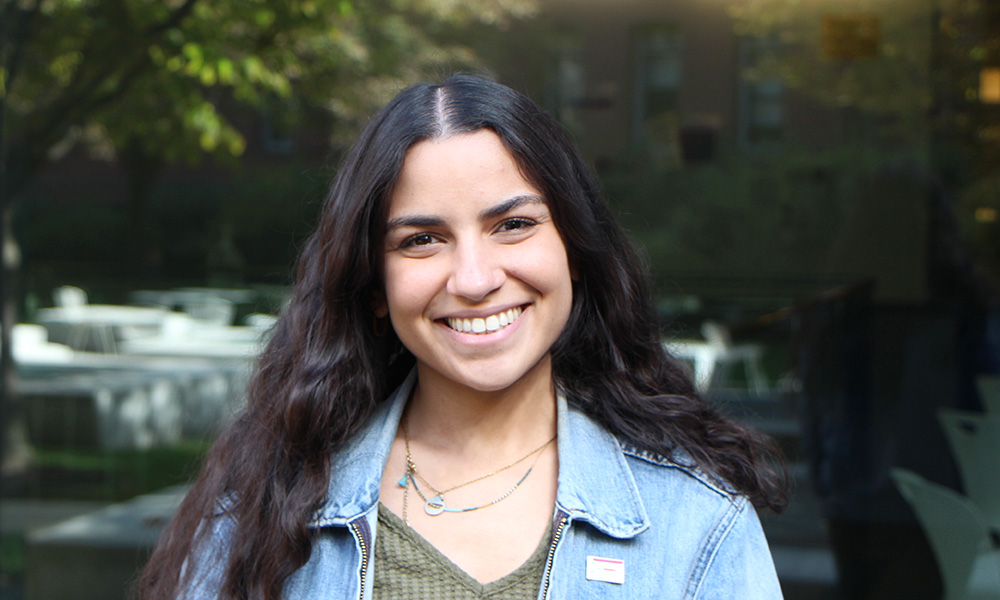Alexa Pérez-Torres, a doctoral candidate in MCO, has started a STEM outreach program to better prepare students in her home of Puerto Rico for the rigors of graduate school. The program, called PResearch, will teach undergraduates how to dissect and understand the information presented in published scientific papers—a sometimes daunting skill that is integral to the success of a researcher. The first program offering will be in spring 2023.
“Papers are difficult to read, period,” says Pérez-Torres. “There’s no way around it, and it’s something, as a grad student, you’re going to have to do almost on a daily basis. If you don’t know how to access that properly in terms of, ‘intellectually, how do I engage with this content?’ then it’s basically useless.”
PResearch—a portmanteau of the initials of Puerto Rico and the word ‘research’— was inspired by MCB 290, an MCO core course that teaches new graduate students how to parse papers. PResearch will tackle this by pairing undergraduates with grad student mentors, who will guide them through the process. Participants will be assigned a paper at the start of the program with the end goal of creating a presentation to demonstrate how much they understood the content and its context.
“They need to determine the most effective way of communicating these ideas where everybody can understand it,” says Pérez-Torres. “It takes so much time to craft these hands-on slides that they really need to focus on what’s important.”
PResearch was accepted as part of the 8th cohort in Science Advocacy Institute’s 10-week SAi Fellows Program which provides funding and mentorship to early stage founders to help them launch new science outreach and engagement initiatives around the world. Pérez-Torres’s mentor in the program is Fanuel Muindi, founder and CEO of SAi who also runs his own science engagement lab at the institute. Muindi is also the former Assistant Director of the MCO Graduate Program.
“I have mentored numerous fellows in the program over the years and I’ve constantly been impressed by their creativity and dedication towards their projects. It’s been an absolute joy to mentor Alexa as she has worked to bring PResearch to life. Her energy and clarity of purpose will undoubtedly enable PResearch to become a fundable, sustainable, and impactful initiative and eventually a non-profit organization in the near future,” says Muindi.
By the end of the program, fellows will have drawn up documents for their programs’ design and implementation, launched a website, and applied for external grants. They also will have a pitch deck that encapsulates their outreach idea to present publicly to SAi residents, former fellows, funders/sponsors, and invited guests during the annual pitch day. The feedback from pitch day attendees provides additional input which further helps the fellows hone their pitches ahead of future fundraising efforts.
“I’m learning a ton about communication, just using different language to approach different problems,” says Pérez-Torres. “How can I convey my ideas clearly at different levels to different types of people? How can I convince the public that my research is important, and will benefit us all?”
While growing up in Puerto Rico, Pérez-Torres has always had a knack for science and math. She expected to use these talents to pursue a career in medicine. But an undergraduate internship focusing on bench research opened her eyes to the idea that everything she was learning in preparation for medical school was discovered by someone and going forward that someone could be her. She switched her focus to research, and, after graduation, she landed at Johns Hopkins for a one-year research program in neuroscience.
When it came time to apply to graduate school, she selected both neuroscience programs and schools that could broaden her horizons. She eventually chose MCO, attracted by its students’ exposure to a number of different labs and disciplines.
Each MCO experience begins with a rotation of three labs. Pérez-Torres chose one lab pursuing neuroscience, one lab that was studying something slightly unfamiliar but still inside her comfort zone, and one totally outside of her expertise.
“And enter Andrew Murray, in that third option. He does not work on the brain or anything in neuroscience. We work in yeast and experimental evolution,” she says.
Working with Murray was so impactful that Pérez-Torres chose to stay there for the remainder of her studies.
“Currently my focus is studying cell cycle-dependent transcription and what happens if you get rid of that regulatory component of the cell cycle,” she says. Faulty transcription of cell cycle genes plays a role in cancer, among other things. Pérez-Torres wants to know if there are any steps of the transcription process that can be skipped without inducing disease, and how to influence transcription to avoid development of cancer, among other things.
“I’m delighted that Alexa chose to join the lab. She brings an infectious energy to her work and has the courage and commitment to tackle an exciting but risky project and has already produced exciting results that challenge conventional wisdom. I look forward to working with her to interact with and encourage students in Puerto Rico,” says Murray.
Pérez-Torres plans to continue pursuing these questions after graduation, hopefully in an academic setting. And regardless of where she ends up, she will continue her work with PResearch, where she hopes to foster relationships between undergrads in Puerto Rico and top universities.
“Maybe I can be part of that bridge,” she says, “and continue to provide more opportunities for students in Puerto Rico.”


